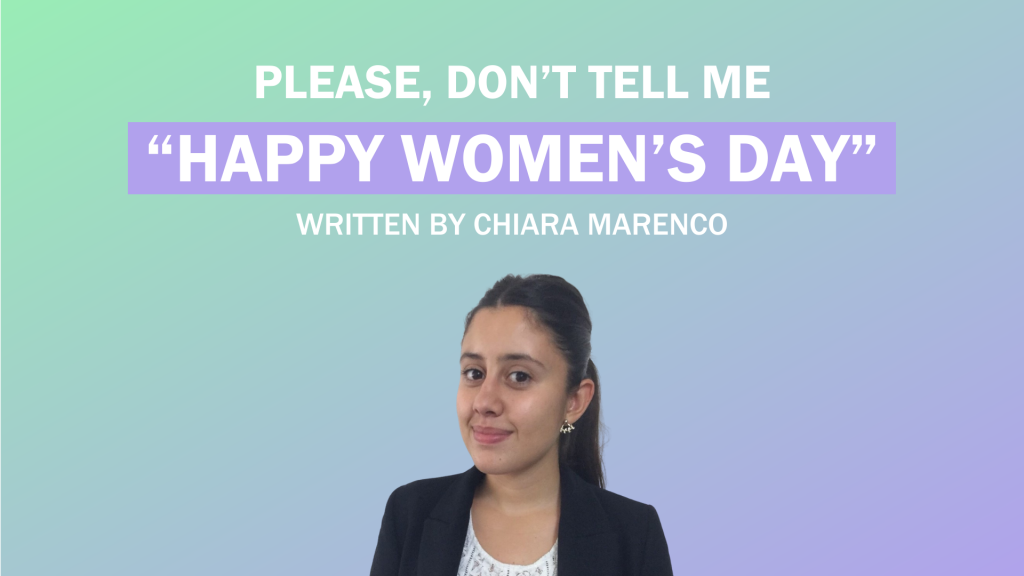Please, Don’t Tell Me “Happy Women’s Day”

Editor’s note: The following article contains graphic content.
This is what we’ve heard hundreds of times on March 8 in Argentina. Women are asking not to get told, “Happy Women’s Day,” nor to receive flowers. Instead, they say, “We will be happy the day that no one is missing.” To understand the reason for this statement (that I know for some of you could be strange), we need to understand what happened and what is still happening in Argentina.
In 2015, the movement “Ni una Menos” (No other woman less) was initiated by some courageous women who were tired of injustice. This is a feminist movement that started in Argentina and has spread across several Latin American countries that made and makes campaigns against gender violence. At that time I didn’t know the meaning of the word feminism. I thought that it was the opposite ofpatriarchy, so I said that I wasn’t a feminist. Now I consider myself 100% a feminist. It seems that the person I was in 2015 is a completely different person than the person I am today. I am proud of that, but I have to thank the movement “Ni una Menos” for that big change.
According to “El Registro Nacional de Femicidios de la Justicia Argentina” (The National Femicide Register of the Argentine Justice) there were a total of 225 femicides (female homicides) in 2014. During this year, the first massive protest was organized. Women were, and still are, dying because of men’s violence. These protests were an inflection point to everything that will happen in the following years: This topic started to have increased media coverage; people started to talk about it; each protest counted, with more and more women fighting for this cause; abortion was legalized; and everyone started to raise awareness about the inequality we face every day.
Although I would love to say that we have less femicides than in 2014, it’s the opposite. The statistics show that we have more femicides each year. I would attribute this to the fact that more women are reporting their cases because they have more information and support by the movement and not because there are more femicides than years ago. Women now have more tools to report violence and be assisted. Besides, it’s important to take into account that in Argentina the data on femicides is really worrying. But that is the most brutal form of violence, and there are many steps before that.
As a student of communication, it is sad to see that even today every time the news talks about femicides, they usually focus on the victim and not on the aggressor, and they judge the girls because of the way they dress before judging the men who killed them. The way the media covers a woman’s death is quite different from when the victim turns out to be a man. Something similar happens with a lot of ads or communication campaigns: Many brands try to make a campaign related to feminism, but they are rapidly criticized because, despite the fact they had good intentions, people did not believe these companies were sincerely concerned about equality and women’s rights, and they felt that these brands were taking advantage of such a sensitive topic.
Companies need to work on having real gender perspectives during the entire year, not only on Women’s Day. Last year, the National University of Lomas de Zamora carried out research that found that 72% of the people that study public relations in Argentina are women, but only 19% of the dircoms (directors of communication) are female. It is hard as a woman to get a high position in our industry. As future professionals we have much more work to do in order to have real equal opportunities. We need to be aware that the way in which we communicate could have a big impact on how we build reality. It is important to do it in a respectful way and raise our voice when we think we can change something at work or any other place.
Society is changing faster than companies, and as consumers we won’t accept certain things that were “normal” years ago. Consumers are speaking up and asking companies to be part of the solution to this problem. If I changed that much from 2015 until now, I am sure that the entire world can change. We just need to understand why this change is a need and not a want. And if you are still wondering why women in Argentina don’t want to hear “Happy Women’s Day” on March 8, it’s because we feel we don’t have anything to celebrate. We would rather receive concrete practices — to have equal job opportunities, to have real protection from the government when we are in a dangerous situation, and we would like to walk alone at night without being afraid. We don’t want to hear “Happy Women’s Day,” or receive chocolates and flowers; we would rather have basic human rights. Public relations and communication professionals can do a lot to contribute to this fight for equal rights and human rights for all women.

Chiara Marenco is a senior global communication student. She is the immediate past president of the Argentinian UADE PRSSA Chapter. She is 21 years old and loves to travel and meet people from different places.
